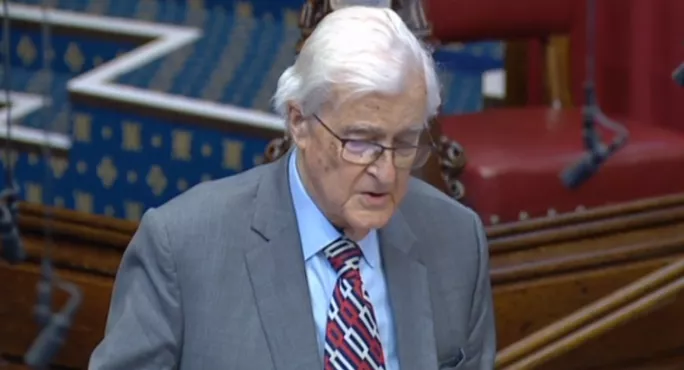Baker: Skills bill ‘can’t make up for school failure’

The government’s new Skills and Post-16 Education Bill will not be able to support young people out of disadvantage because it does not address the failures of education in England for 11 to 16 year-olds, a former education secretary has warned.
Speaking on day one of the committee stages of the bill in the House of Lords yesterday, Lord Baker of Dorking, who chairs the Baker Dearing Trust that created university technical colleges (UTCs), said the bill focused on 16-19 education “but it cannot be looked at just as a separate section - it depends on what has happened between 11 and 16”.
“If you have made a mess of 11 and 16, you can’t compensate for it with this bill, and I believe that since 2010, we’ve made a mess of 11 to 16 education,” said Lord Baker. “The number of disadvantaged children today - if you don’t get level 4 in English and maths, you are considered to be disadvantaged - is between 30 and 35 per cent. That is not a small minority - it is about 2 million students, who failed after 14 years of free state education to acquire a basic literacy and numeracy qualification. It is a huge indictment of the English education system, and what has been imposed on it since 2010.”
Lord Baker: Schools must give students FE advice
More: Call to give adults free access to online GCSE exams
Lord Adonis: Give mayors power on Local Skills Plans
Lord Baker told the Lords that Michael Gove, when he was education secretary between 2010 and 2014, had “imposed his curriculum without any consultation whatsoever upon the schools”. “His curriculum consists of eight academic subjects - two English, one maths, three science, one foreign language, and either history or geography. That, my Lords, is a grammar school curriculum. It is an academic curriculum, and it excluded any sort of technical training, any sort of computer training, any sort of design training, any sort of cultural studies.
Skills bill ‘won’t be able to help disadvantaged young people’
“So what you have seen since 2010 is no fall in the number of disadvantaged children. There has been no significant improvement, and I fear that the attainment gap between the brightest and the least bright students will have grown substantially during Covid. So, really, the victims of this policy are the disadvantaged and the unemployed. I see no particular measure in this bill that will prove a significant change in dealing with the skills gaps in our country.”
Lord Baker added that the bill should have been “a wonderful opportunity to create a combination between academic and technical education and, in fact, it makes the division even greater”. He said it would encourage school leaders to suggest to learners that staying on for sixth form was the “best way to get to university”, while “all the rest will be going down the technical route, and that is a real divide”.
“The bill actually says in clause 4 that schools and 16-19 academies are not going to be allowed to teach technical education. It says it on statute. I never thought I would see that particular definition in an English law, least of all brought back by a Conservative government. That is a complete bifurcation. There is an academic route and there is a less academic route, and that is not really what should happen.”
The clause defines the education providers as discussed in the bill, and states that this does not include schools.
‘Educational apartheid’
Lord Baker said UTCs included both academic and technical education and had “magnificent results”.
He said: “This bill really does not have that role in it whatsoever. It is, my Lords, educational apartheid, and I don’t use that word lightly. That is what this is - there are two clear routes in the future. Where is the parity of esteem? There is no real advantage here in this bill to disadvantaged children, and I regret it very much.
“When we talk about disadvantaged children, just remember, in every child, there is a little bit of flint - sometimes you have to dig very, very deep for it - but that is what the purpose of education is: find that bit of flint and create a spark. And that piece of flint has to be found long before 16. It has to be found in the primary level and in the secondary level, and that is what we are failing to do as a country.”
Responding in the House of Lords yesterday, Department for Education minister Baroness Berridge said there was “no prescription in the bill to say 11 to 16 should not be teaching technical education”.
“We have just said in clause 4 that in relation to the relevant providers being under a duty to cooperate, we haven’t, at this stage, given that burden to schools,” she said. “It is clear in clause 4 that actually, by regulation, the secretary of state can change that and make them one of the relevant providers that would then have a duty to cooperate.”
You need a Tes subscription to read this article
Subscribe now to read this article and get other subscriber-only content:
- Unlimited access to all Tes magazine content
- Exclusive subscriber-only stories
- Award-winning email newsletters
Already a subscriber? Log in
You need a subscription to read this article
Subscribe now to read this article and get other subscriber-only content, including:
- Unlimited access to all Tes magazine content
- Exclusive subscriber-only stories
- Award-winning email newsletters